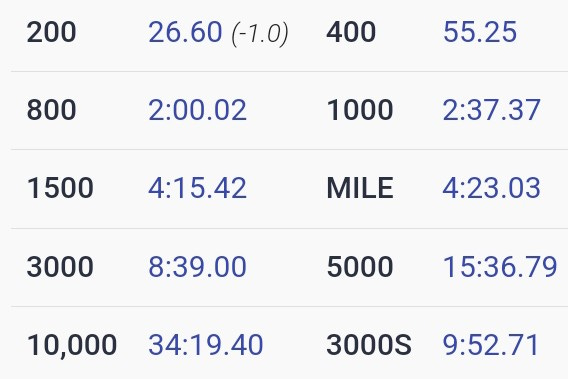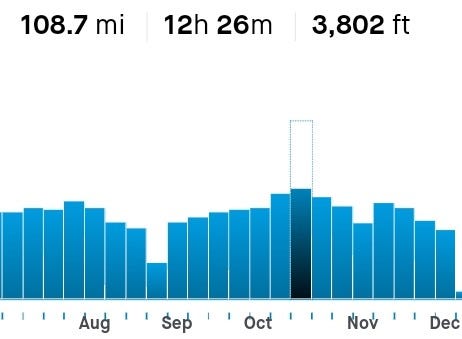Jarrod Ottman shouldn't seem like a throwback or a radical outlier, yet he does
When runners shortchanged by externalities in high school and college develop into great marathoners, the formula is usually the same
Shortly after the 2022 California International Marathon in December, I got a text about someone who'd run 2:16:31 in his first marathon—he wasn't good enough at the time to call it a debut—asking, “Do you know this guy?”
My texter wasn't asking this question because the runner lives near Boulder. He was asking it because the man who had produced this flawlessly paced effort—essily under the 2:18:00 requiredto quakigy for the U.S. Olympic Trials—was turned in by another New Hampshire native.
I informed my digital interlocutor that ever since New Hampshire's population crept past the one-million mark, I probably don't even know half of my fellow Granite Staters. But because I have mosely followed New Hampshire high-school running since the 1980s, the name did in fact ring a faint bell.
A few minutes of research1 confirmed that in 2016, Jarrod Ottman graduated from Merrimack High School, where I was a substitute teacher in 1999. As a junior, he decided to do indoor track solely to bolster his fitness for soccer in the fall. He wound up running a leg on a 4 x 800-meter relay team that ran 8:53 at the Division I State Championships. That spring, he qualified for the D-1 state meet as an individual in the 1,600 meters. This prompted him to dump soccer for year-round running as a senior.
In his one season of cross-country, Ottman finished 19th at D-1 States and 27th at the Meet of Champions, meaning that he'd have been far outside the top hundred or even two hundred schoolboy runners in the state of Colorado and practically invisible. That winter, he ran 4:19 in the 1,500 meters (worth about 4:38 for 1,600 meters) at the D-1 State Championships for seventh place, failing to advance to the New Englands. Outdoors, Ottman grabbed sixth place in the 1,600 meters (4:27) and 18th (and last) in the 3,200 meters (10:20). He advanced to the 3,200 meters in the Meet of Champions anyway, there coronating his brief high-school career with an 11th-place 9:54.
Ottman attended Thomas College in Waterville, Maine. When he matriculated, the school offered cross-country but not varsity track. Ottman ran cross with the team and track meets unattached until his college added track as a varsity sport before his junior year. That year would include Ottman’s only collegiate outdoor track season, as his senior spring in 2020 was sacrificed along with many personal livelihoods to a contrived “pandemic” whose progenitors should be publicly slaughtered like the rabid rodents they are.
The building of the aerobic Ottman Empire of today arose from the rich soil of unfinished business.
As a collegian, Ottman had run everything from a (wind-legal) 26.6 200 meters to 10K cross-country races2. He'd improved substantially from his high-school days for someone at an “incomplete” D-3 NCAA program. But realistically, he'd finished high school with personal bests similar to the best-ever high-school girls, and his collegiate distance bests were of a piece with the NCAA women's records.
Ottman wound up in Colorado with the encouragement of one of his college coaches, Brendan Gilpatrick3, who now guides his training; the beckoning of Parker Stinson, who I believe will run under 2:08:00 within the next three years, was also a factor4.8
Below are key takeaways (that is, things I happen to strongly and selectively agree with) from a chat with Ottman posted on The Lap Count on December 305 (emphases and footnote mine).
You just have to build mileage and run a lot at marathon pace6 and just get used to it. I threw in some faster stuff occasionally, but I mostly just hung on to high mileage – higher mileage, I only did a couple of 100-mile weeks. Like I said, nothing crazy.
The people I train with show up occasionally to a Roots workout here and there. I don’t run with them very often, maybe once every couple of months, I just hop in. Other than that I did my entire build-up with my buddy Alex.
I have stressed here that two major ways local runners with the talent to reach the Olympic Trials in the marathon wind up falling short are failing to train like marathoners and getting too involved with groups of people who—while fun to run and drink beer and trade elite gossip with—just aren't the best training partners. Group settings of this type tend to be suboptimal for everyone in the group who winds up altering their training, usually unconsciously, in ways that don't help. And that winds up being virtually everyone in the cluster.
Ottman averaged close to 85 miles a week for 2022. In the heart of his CIM build-up, he held an average of around 100 miles a week for about five weeks7.
Most successful marathoners either do most of their mileage alone or run with one or two partners of closely matched ability. No hubris, no bullshit.
It's also unclear to me why so many runners at, say, the 2:28/2:47 level (10 minutes off the men's and women's Olympic Trials standards) seem convinced that they'll gain the required fitness by increasing their weekly mileage from 70 to 80 and doing harder speed workouts and short tempos. If homeboy ot homegirl had the talent to run 2:18 or 2:37 on ideal half-marathon training, homeboy or homegirl would have already done so. ?
Who the hell moves out here just to keep listening to the “coaching” committees in their own heads? The answer, curiously, is “lots of people.” Ottman seems like a cool guy and obviously has an “inspirational” story, but most of the people praising him would never train like he does despite having the same aims and inherent talent level.
One other factor might be giving Ottman edge. He indicates on his Instagram profile8 that he's strongly religious. While I am not, it's easy to see how having strong faith in something external, timeless, and portable could not only improve someone's focus but prove psychologically ameliorative considering how plain fucked up everything in the world has become in the past three years.
Based on Ottman’s history, he should soon be matching the times of the world's best women. But based on his trajectory, attitude, and the fact that he hasn't yet explored truly sufficient mileage, he's a good bet to eventually run no slower than 2:10-2:11.
https://lancertiming.com/results.htm
https://www.tfrrs.org/athletes/7011805/Thomas_College/Jarrod_Ottman.html
https://dirigoendurance.com/
https://www.d3glorydays.com/podcast/episode-113-jarrod-ottman
https://thelapcount.substack.com/p/the-victory-lap-jarrod-ottman
https://archive.ph/wip/F4z3n
https://www.strava.com/athletes/5973701
https://www.instagram.com/j.ottman/



